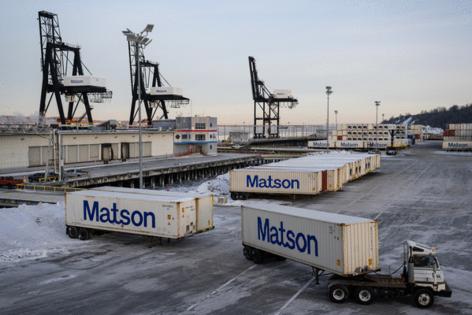Federal appeals court overturns $367 million award to Anchorage in lawsuit over faulty port construction
Published in News & Features
ANCHORAGE, Alaska — A federal appeals court panel has overturned a previous decision that awarded more than $367.4 million to the Municipality of Anchorage in its lawsuit against the federal government over failed construction work at the Don Young Port of Alaska.
In an opinion issued Monday, a panel of judges with the U.S. Court of Appeals for the Federal Circuit partially rescinded a 2021 ruling that a federal claims court judge had made in the municipality’s favor and slashed damages awarded to just $11.3 million.
“This is a disappointment, and we are continuing to consider appropriate next steps,” Mayor Suzanne LaFrance said during her opening remarks at Tuesday night’s Assembly meeting.
Anchorage entered a memorandum of agreement with the federal Maritime Administration, or MARAD, back in 2003 to overhaul the facility. The city later discovered much of the work done by subcontractors had been botched.
The U.S. Court of Federal Claims in 2021 held MARAD liable, due to its poor oversight and management of the project. In total, the federal claims judge found the federal agency breached two contract agreements with the city.
The judge the next year awarded the city the full sum of damages it sought: $180.8 million for the value of the project, and $186.6 million to remediate the faulty work.
That decision had been hailed as a victory by city leaders in the yearslong legal saga that started in 2013.
Now, it appears the city won’t see a dime any time soon.
“The main thing that this means, honestly, practically, is delay. It means more litigation. It means that we’re not done after 10 years,” Municipal Manager Becky Windt Pearson said Wednesday.
In Monday’s opinion, U.S. Circuit Judge Todd M. Hughes wrote that MARAD was not actually required to deliver the city with a finished, structurally sound port under the memorandum of agreement.
“Anchorage’s assertion that MARAD was required to deliver a defect-free port disregards the 2003 memorandum’s text,” Hughes said in the opinion.
The memorandum “does not state that MARAD was responsible for delivering anything to Anchorage,” he said.
Instead, the federal opinion puts the onus on Anchorage officials.
The panel found that, under the memorandum, the municipality was responsible for providing the overall program requirements and direction of the port expansion to MARAD, and for reviewing all plans, status reports from contractors, and certifying completion of the work.
“Specifically, Anchorage was required to certify that a contractor’s work was acceptable and, if so, would issue a certificate of completion to MARAD,” Hughes wrote. “Only with the completed certificate of completion could MARAD accept the work and pay the contractor.”
The panel did confirm the federal claims judge’s prior decision holding that MARAD broke an agreement with the municipality when it agreed to a roughly $11.3 million settlement with subcontractors that claimed they were not reimbursed for work.
Monday’s decision kept intact that amount awarded to the city, and sent the case back to the claims court to consider whether there were any other breaches of duty by MARAD and other damages due, Windt Pearson said.
The city could choose to bring additional arguments to the federal claims court, or it could file for a re-hearing of the full U.S. Court of Appeals, she said.
“We’ll be making some decisions in the next month and a half about what our strategy is going forward,” Windt Pearson said.
The municipality disagrees with the panel’s interpretation of the memorandum and believes that MARAD had a duty to deliver a defect-free port, she said.
After the city entered the port overhaul agreement with MARAD, much of the work done by subcontracted companies proved to be faulty. A city-commissioned study in 2013 found the design and construction were defective and would need to be redone.
A 2013 U.S. Department of Transportation inspector general audit of MARAD found that the agency failed to adequately plan or to oversee the work being done at the port. Its “flawed execution of its port infrastructure development responsibilities” led to significant setbacks, construction problems and schedule delays, the audit found.
Monday’s decision comes as a financial blow to the municipality as it pushes ahead with a massive modernization program underway at the port, a second attempt at the infrastructure upgrade project that includes stabilizing the failed expansion work done under the agreement with MARAD.
The port’s infrastructure is deteriorating, putting at risk a critical piece of the state’s supply chain. About 75% of the state’s inbound cargo comes through the Port of Alaska.
Officials have estimated the total modernization project will cost between $1.8 billion and $2.2 billion.
The Anchorage Assembly last month approved a $180 million bond sale and designs for rebuilding the port’s two cargo terminals, and the city is currently preparing to move ahead with construction of the first cargo terminal.
Without the large settlement, the municipality may need to rely more heavily on such revenue bonds to pay for the program. Those are paid back through surcharges on goods that come across the port docks, costs that consumers generally end up paying.
“The short answer is, that’s the ultimate fallback,” Windt Pearson said. “... That would have an impact on consumers. That’s not the plan.”
The city is seeking other funding options, she said.
So far, the port has secured more than $500 million in federal and state grants to help pay for the project, according to Chief Administrative Officer Bill Falsey.
_____
©2024 Anchorage Daily News. Visit at adn.com. Distributed by Tribune Content Agency, LLC.







Comments